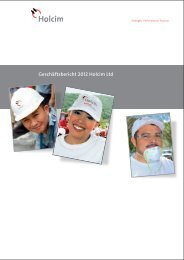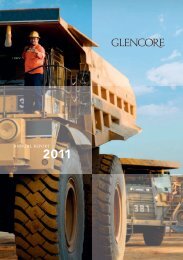Transocean Proxy Statement and 2010 Annual Report
Transocean Proxy Statement and 2010 Annual Report
Transocean Proxy Statement and 2010 Annual Report
Create successful ePaper yourself
Turn your PDF publications into a flip-book with our unique Google optimized e-Paper software.
The application of the Working Time Regulations to the offshore sector could result in higher labor costs <strong>and</strong> could undermine our ability to<br />
obtain a sufficient number of skilled workers in the U.K. Legislation has been introduced in the U.S. Congress that could encourage<br />
additional unionization efforts in the U.S., as well as increase the chances that such efforts succeed. Additional unionization efforts, if<br />
successful, new collective bargaining agreements or work stoppages could materially increase our labor costs <strong>and</strong> operating restrictions.<br />
Worldwide financial <strong>and</strong> economic conditions could have a material adverse effect on our revenue, profitability <strong>and</strong><br />
financial position.<br />
The worldwide financial <strong>and</strong> economic downturn reduced the availability of liquidity <strong>and</strong> credit to fund the continuation <strong>and</strong><br />
expansion of industrial business operations worldwide. The shortage of liquidity <strong>and</strong> credit combined with losses in worldwide equity<br />
markets led to an extended worldwide economic recession. Our ability to access the capital markets may be severely restricted at a time<br />
when we would like, or need, to access such markets, which could have an impact on our flexibility to react to changing economic <strong>and</strong><br />
business conditions. Recent worldwide economic conditions impacted lenders participating in our credit facilities <strong>and</strong> our customers, <strong>and</strong><br />
another economic shock could cause them to fail to meet their obligations to us. The slowdown in economic activity caused by the<br />
recession also reduced worldwide dem<strong>and</strong> for energy <strong>and</strong> resulted in an extended period of lower oil <strong>and</strong> natural gas prices. Crude oil<br />
prices, although recently on the rise, have declined from record levels in July 2008, <strong>and</strong> natural gas prices have also experienced sharp<br />
declines. Declines in commodity prices, along with difficult conditions in the credit markets, have had a negative impact on our business,<br />
<strong>and</strong> this impact could continue or worsen.<br />
Our business involves numerous operating hazards.<br />
Our operations are subject to the usual hazards inherent in the drilling of oil <strong>and</strong> gas wells, such as blowouts, reservoir damage,<br />
loss of production, loss of well control, punch-throughs, craterings, fires <strong>and</strong> natural disasters such as hurricanes <strong>and</strong> tropical storms. In<br />
particular, the South China Sea, the Northwest Coast of Australia <strong>and</strong> the U.S. Gulf of Mexico area are subject to typhoons, hurricanes or<br />
other extreme weather conditions on a relatively frequent basis, <strong>and</strong> our drilling rigs in these regions may be exposed to damage or total<br />
loss by these storms, some of which may not be covered by insurance. The occurrence of these events could result in the suspension of<br />
drilling operations, damage to or destruction of the equipment involved <strong>and</strong> injury to or death of rig personnel. Some experts believe global<br />
climate change could increase the frequency <strong>and</strong> severity of these extreme weather conditions. We are also subject to personal injury <strong>and</strong><br />
other claims by rig personnel as a result of our drilling operations. Operations also may be suspended because of machinery breakdowns,<br />
abnormal drilling conditions, failure of subcontractors to perform or supply goods or services, or personnel shortages. In addition, offshore<br />
drilling operations are subject to perils peculiar to marine operations, including capsizing, grounding, collision <strong>and</strong> loss or damage from<br />
severe weather. We may also be subject to property, environmental <strong>and</strong> other damage claims by oil <strong>and</strong> gas companies. Our insurance<br />
policies <strong>and</strong> contractual rights to indemnity may not adequately cover losses, <strong>and</strong> we do not have insurance coverage or rights to<br />
indemnity for all risks. There are also risks following the loss of control of a well, such as blowout or cratering, including the cost to regain<br />
control of or redrill the well <strong>and</strong> associated pollution. Damage to the environment could also result from our operations, particularly through<br />
oil spillage or extensive uncontrolled fires.<br />
We maintain insurance coverage for property damage, occupational injury <strong>and</strong> illness, <strong>and</strong> general <strong>and</strong> marine third-party<br />
liabilities. We generally have no coverage for named storms in the U.S. Gulf of Mexico <strong>and</strong> war perils worldwide. We also self-insure<br />
coverage for expenses incurred by ADTI <strong>and</strong> CMI related to well control <strong>and</strong> redrill liability for well blowouts. Also, pollution <strong>and</strong><br />
environmental risks generally are not totally insurable. We maintain a $125 million per occurrence deductible for damage to our offshore<br />
drilling equipment. However, in the event of a total loss of a drilling unit there is no deductible. We also maintain per occurrence<br />
deductibles generally ranging up to $10 million for various third-party liabilities <strong>and</strong> an additional aggregate annual self-insured retention of<br />
$50 million. We generally retain the risk for any liability in excess of $1.0 billion.<br />
If a significant accident or other event occurs <strong>and</strong> is not fully covered by insurance or an enforceable or recoverable indemnity<br />
from a customer, it could adversely affect our consolidated statement of financial position, results of operations or cash flows. The amount<br />
of our insurance may be less than the related impact on enterprise value after a loss. Our insurance coverage will not in all situations<br />
provide sufficient funds to protect us from all liabilities that could result from our drilling operations. Our coverage includes annual<br />
aggregate policy limits. As a result, we retain the risk for any losses in excess of these limits. We generally do not carry insurance for loss<br />
of revenue unless contractually required, <strong>and</strong> certain other claims may also not be reimbursed by insurance carriers. Any such lack of<br />
reimbursement may cause us to incur substantial costs. In addition, we could decide to retain substantially more risk in the future.<br />
Moreover, no assurance can be made that we will be able to maintain adequate insurance in the future at rates we consider reasonable or<br />
be able to obtain insurance against certain risks. As of February 10, 2011, all of the rigs that we owned or operated were covered by<br />
existing insurance policies.<br />
Regulation of greenhouse gases <strong>and</strong> climate change could have a negative impact on our business.<br />
Some scientific studies have suggested that emissions of certain gases, commonly referred to as “greenhouse gases” (“GHGs”)<br />
<strong>and</strong> including carbon dioxide <strong>and</strong> methane, may be contributing to warming of the Earth’s atmosphere <strong>and</strong> other climatic changes. In<br />
response to such studies, the issue of climate change <strong>and</strong> the effect of GHG emissions, in particular emissions from fossil fuels, is<br />
attracting increasing attention worldwide.<br />
Legislation to regulate emissions of GHGs has been introduced in the U.S. Congress, <strong>and</strong> there has been a wide-ranging policy<br />
debate, both in the U.S. <strong>and</strong> internationally, regarding the impact of these gases <strong>and</strong> possible means for their regulation. Some of the<br />
AR-19

















